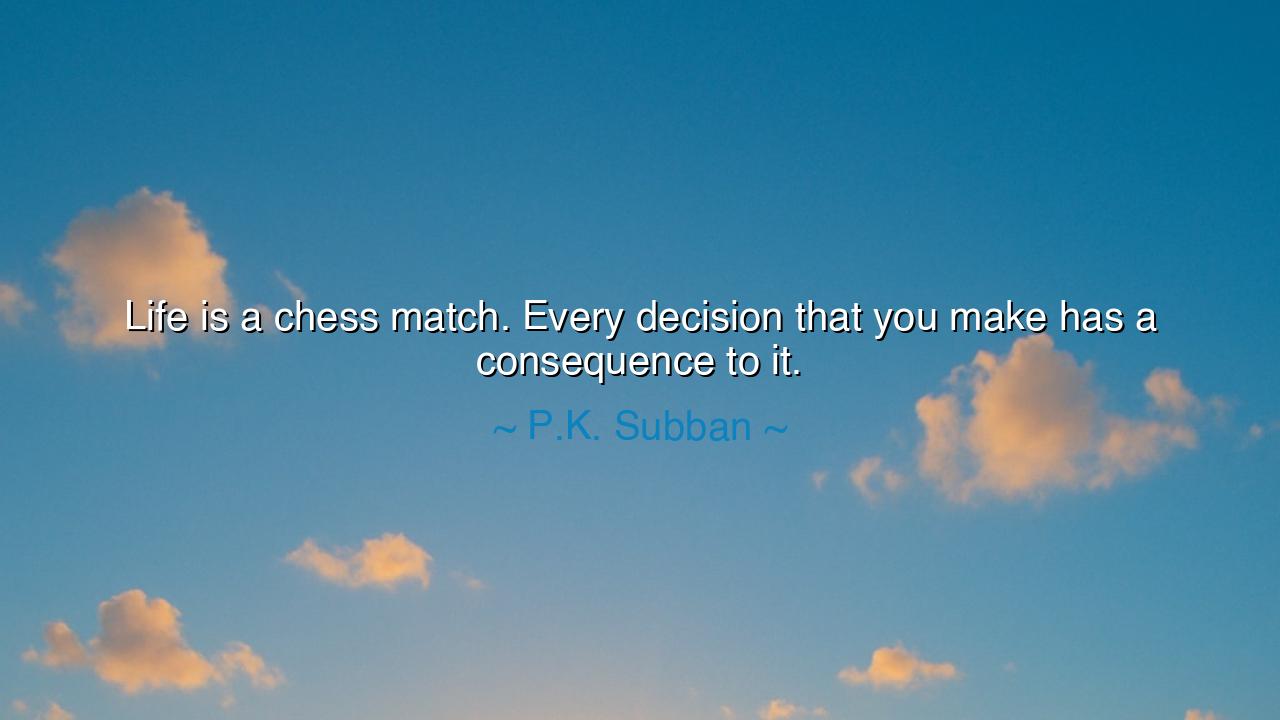
Life is a chess match. Every decision that you make has a






In the grand theater of life, every choice we make is like a move on a chessboard, each one carrying its own weight, its own significance, and its own consequences. As P.K. Subban wisely states, "Life is a chess match. Every decision that you make has a consequence to it." This profound insight reflects a truth that has been known to philosophers and strategists alike: that life is a game of strategy, and every action we take, no matter how small, sets into motion a series of events, leading us down paths we may not have fully anticipated. Like a chess player contemplating the next move, we must consider the implications of each decision, understanding that the road ahead is shaped by the choices we make in the present.
In the ancient world, rulers and generals often viewed their actions through a similar lens. Sun Tzu, the legendary Chinese military strategist, wrote in his timeless work, The Art of War, that the key to victory lay in understanding the consequences of one's actions and planning each move carefully. He knew that every decision in battle, whether it was the positioning of troops or the timing of an attack, carried the potential to either lead to triumph or to doom. His insights extend beyond the battlefield, suggesting that all aspects of life—whether in politics, family, or personal affairs—are shaped by a constant interplay of choices and outcomes. Just as in chess, where a single misstep can lead to defeat, so too can a single poor decision in life change our course.
Consider the story of Alexander the Great, whose life was both a series of strategic decisions and their inevitable consequences. His remarkable conquests and military genius were built upon his ability to make decisions with clarity and purpose, yet even he was not immune to the unintended consequences of his choices. The decision to march into India, for instance, stretched his army to the breaking point, leading to unrest and eventual rebellion. Alexander's story serves as a reminder that even the greatest of strategists must reckon with the consequences of their actions. In life, as in chess, no victory comes without its price, and every move must be weighed against the potential cost.
In our own lives, the lessons from Subban’s analogy and the wisdom of ancient strategists remind us that we are the architects of our fates. Each decision, whether it concerns our careers, relationships, or personal growth, has the power to influence the course of our existence. Fate is not a mere accident; it is the result of the choices we make. In the quiet moments when we must decide which path to take, we must ask ourselves, “What are the consequences of this choice? What is the cost of my action or inaction?” Understanding that life is a series of moves, and that each move carries with it a weight of consequence, allows us to live more mindfully and purposefully.
The ancient Stoic philosophers, such as Marcus Aurelius and Epictetus, would have agreed with Subban's assertion. They taught that life is beyond our control, but our responses to life’s challenges are not. The Stoics emphasized that we are responsible for the choices we make and that we must accept the consequences with courage and dignity. They believed that we cannot control the external world, but we can control our internal reactions and the decisions we make. This approach aligns with the idea that life, like a chess match, is a series of moves—each one leading to the next, and each one shaping the future we create.
In the story of Thomas Edison, the inventor who gave the world the light bulb, we also see a man who understood the deep connection between decisions and their consequences. Edison famously said, “I have not failed. I’ve just found 10,000 ways that won’t work.” His decisions to persist through countless failures ultimately led to success, yet his ability to learn from each setback and adapt his approach shows us that the consequences of our choices are not always immediately apparent. Sometimes, it is through failure that we gain the greatest clarity and wisdom, and we learn to make better decisions in the future.
Ultimately, P.K. Subban's words encourage us to recognize that life, much like a chess match, is shaped by strategy and foresight. We must learn to approach our decisions with the careful attention of a seasoned strategist, considering both the immediate and long-term consequences of each choice. By doing so, we avoid acting impulsively and instead create a life filled with purpose, direction, and wisdom. As we navigate the complexities of life, let us remember that each move—each decision—is an opportunity to shape our destiny. With thoughtfulness and intention, we can ensure that the moves we make lead to a life of fulfillment and success, guided by the lessons of the past and the wisdom of the ages.






AAdministratorAdministrator
Welcome, honored guests. Please leave a comment, we will respond soon